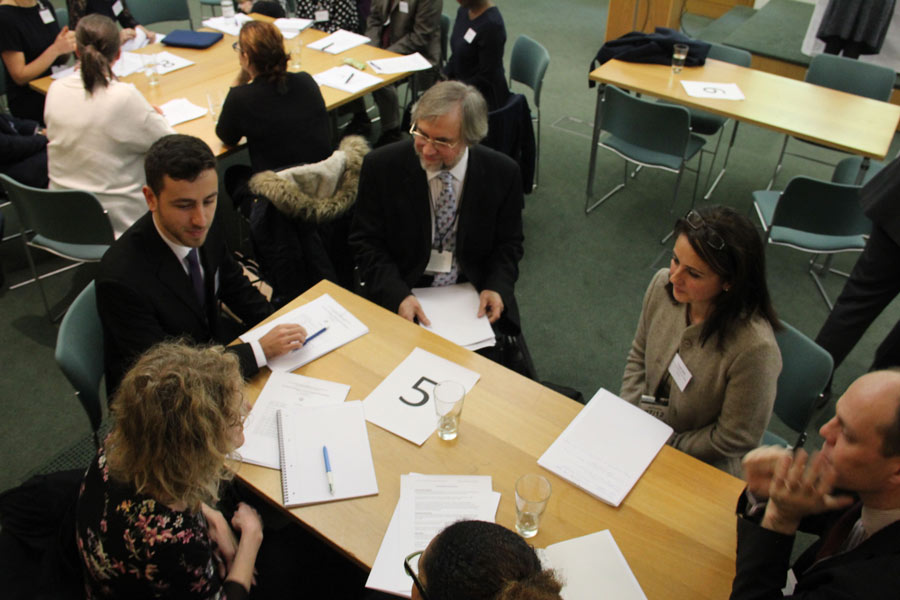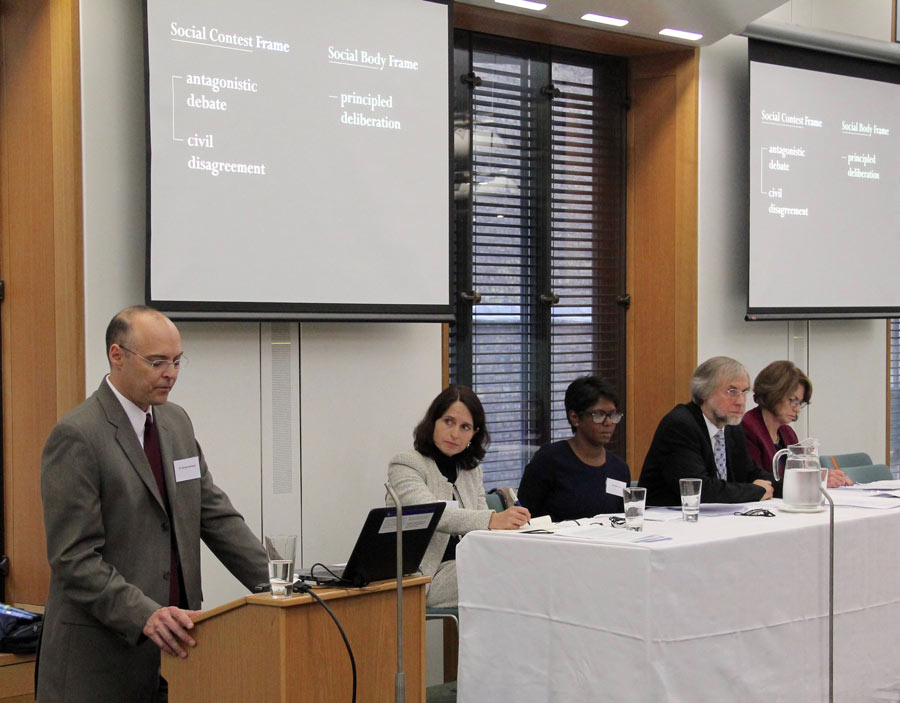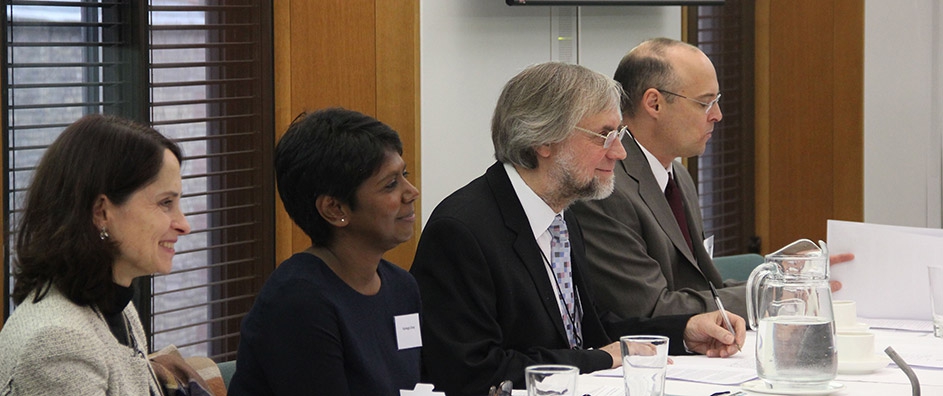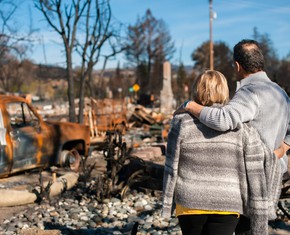Can we change the character of our national conversations, and alter the terms we use to talk to each other?
Recently, the United Kingdom’s Baha’i public affairs office invited a group of parliamentarians, journalists, academicians, and civil society actors to explore these questions. The dialogue which ensued benefited from the rich and diverse experiences of the participants. Numbering fifty, attendees included representatives from the Religion Media Centre, the British Humanist Society, SOAS University of London, the Rand Corporation, and the 3 Faiths Forum, among others.
In a statement addressed to the participants, the Baha’i public affairs office wrote:
Many challenging conversations are being held at all levels of society, which are of great significance to our shared future. These conversations include the nature of our shared national values, social cohesion, the equality of women and men, the role religion plays in public life, migration, freedom of speech, freedom of religion or belief, and the economy.
In order for our society to progress, it is clear that all who are concerned need to be enabled to participate fully in these discussions.
The seminar opened with presentations given by five panelists, followed by a discussion and a Q&A session. People then divided into smaller groups to discuss specific themes in greater depth.

The seminar opened with presentations that were given by the 5 panelists followed by a discussion and a Q&A session. People then divided into smaller groups to discuss specific themes in greater depth.
Prof. Martyn Barrett of the University of Surrey drew attention to a critical yet underappreciated dimension of efforts to build a more harmonious society—friendship.
“Hostility, intolerance, and prejudice can be reduced by bringing individuals from different cultural groups into contact with each other,” he said. “Ideally, this contact should allow for meaningful friendships to develop and should involve activities aimed at achieving common goals. In other words, cooperation rather than competition should define interactions between people.”

Prof. Michael Karlberg addressing the audience: “What we need is a more mature model of public discourse that reflects the understanding that we are all members of an interdependent social body.”
Another of the opening speakers, Prof. Michael Karlberg of Western Washington University, discussed the need for modes of dialogue that are based on cooperation and interdependence. “As 2016 draws to a close,” he stated, “We need to ask ourselves, soberly: How are civil disagreement and combative debate working out for us? Are they leading to the world we want to leave behind for our children? Are they enabling us to solve the mounting social and environmental problems we are facing in the twenty-first century? Are they promoting meaningful forms of social cohesion?
“What we need is a more mature model of public discourse that reflects the understanding that we are all members of an interdependent social body and that we have the potential for altruism, just as we do for egoism,” he continued. “To realize our altruistic potential, however, requires education, effort, and free will.”
The Director of St. Ethelburga’s Centre for Reconciliation and Peace, Dr. Justine Huxley, spoke about avoiding the trap of creating two sides to every issue. If this can be done, she explained, then dialogue can demonstrate its tremendous potential to bring people from different backgrounds together.
Challenging questions were also raised about how the media shapes the character of public dialogue. Speakers discussed how the media can sometimes exacerbate conflict by presenting issues as binary choices, where people are forced to take sides rather than being given a way to explore the complexities of social issues today in a more nuanced manner.
“It is the duty of journalists to present issues in a way that encourages people to work together,” said Karnagie Sharp, a BBC journalist. Ms. Sharp acknowledged that this duty is not easily fulfilled, especially when the media is driven by profit.
“The sad truth is that sensationalism sells. There is irresponsible journalism that sets us on a path of hatred and destruction and actively works against social cohesion,” she stated.
Prof. Karlberg addressed a similar point in his presentation as well, arguing that “commercially-mediated public discourse tends to lead to a war of words between the most extreme voices in the public sphere and advertising-financed media can become a hindrance to social cohesion.”
Reflecting on the event afterward, representative of the UK Baha’i community Yas Taherzadeh commented on some of the early insights from the event:
“Many of the participants highlighted the fact that this style of participatory and inclusive dialogue was a novel and unique contribution to existing forms of dialogue in Parliament. They also commented on the timely nature of this event and how it is very much needed within the current social and political landscape. A clear question that was posed at the end of the seminar by participants was, ‘What happens next?’ And there is much anticipation for further engagement and action.
“We are hopeful that this vital conversation around dialogue will continue in the coming months and expand to growing numbers of people who are committed to building a more cohesive and harmonious society,” she further explained.
…universal fellowship, close and warm, and unalloyed love, and spiritual relationships, will connect all the hearts in the world. Then will all humankind, because of this fresh and dazzling bounty, be gathered in a single homeland. Then will conflict and dissension vanish from the face of the earth, then will mankind be cradled in love… – Abdu’l-Baha, Selections from the Writings of Abdu’l-Baha, pp. 19-20.
The event, held in London’s Portcullis House on December 7th, 2016, was hosted by the All Party Parliamentary Group on the Baha’i Faith and chaired by two Members of the British Parliament, Louise Ellman and Alistair Carmichael.
















Comments
Sign in or create an account
Continue with Googleor